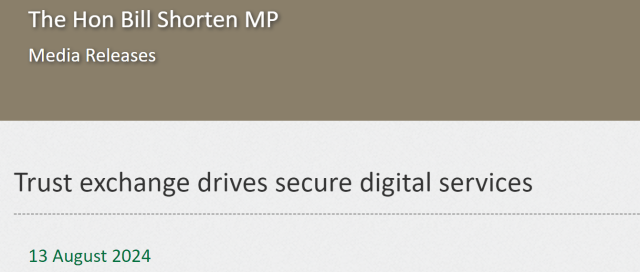From TOTT NEWS AUSTRALIA
Recently retired Government Services Minister Bill Shorten, yes, rats deserting a sinking sip, unveiled before his departure the "Trust Exchange", or "TEx", a new framework that will usher in Australia’s long-envisioned digital identity agenda on a federal level.
Creeping totalitarianism and its digital enabling is well in play in the Land Down Under, a warning to the rest of the world as to just how far contemporary governments will go in the war against their own citizenry.
The new Digital ID verification scheme has been unveiled by Government Services Minister, Bill Shorten, following the passing of legislative framework in May.
By the end of this year, all Australians will be able to use the ‘gold standard’ digital ID platform on their phones to share private personal information, instead of handing over documents such as a passport or driver’s licence.
It’s called the “Trust Exchange”, or TEx, designed to hold sensitive data centrally and provide ‘tokens’ (yes, tokens) to businesses or services asking for identification, to vouch for the user’s authenticity or identity.
Accessed via a person’s myGov wallet, the technology will store information such as date-of-birth, address, citizenship, visa status, qualifications, occupational licences or working with children check, and other information already held by the government.
Shorten said the scheme, which he described as “brand new and world-leading”, would make sharing personal information “more secure and more trustworthy”.
Unveiling the plans during a speech at the National Press Club in Canberra on Tuesday, Shorten gave several examples of how the process might work.
If booking a hotel, for example, TEx could be used to “digitally shake hands” with your myGov account to verify the identification held there.
‘Love your work, Big Brother!’ (shakes hand).
Shorten said it that the new system would eliminate the need to hand over a driver’s licence or passport, giving the example of a young person going to a club without having to show.
“It’s just a digital thumbs up from the government — you are who you say you are”.
He said while the “token” would be of value to the business seeking to confirm someone’s identification, it would contain no personal information.
TEx, according to the government, is currently in the “proof of concept stage” and has an $11.4 million investment behind it.
The government hopes to have built out the system by the end of the year and will “review its options” for pilot schemes by January 2025.
And once linked to government services and the impending Western social credit system model, Australian society as we know it may never be the same.
BIG BROTHER IS WATCHING
After many years, we are finally at the crossroads. A fully-fledged Digital ID scheme is launching.
TOTT News has followed in far greater detail than any other Australian media outlet these developments for over a decade now, revealing in August last year the exact details of the government’s short-term and long-term strategy for identity schemes.
https://tottnews.com/2023/08/14/revealed-australias-national-digital-id-strategy/
The signs were everywhere, as the biometric surveillance began to emerge from the corporate whiteboards to employment services and state-based government services.
https://tottnews.com/2022/11/20/nsw-digital-id-pilot-program/
https://tottnews.com/2023/09/29/australia-national-skills-passport/
In 2021, during the pandemic, it was announced that an oversight body was being established in preparation for this push, raising the alarm bells for many Australians who cared to notice.
https://tottnews.com/2021/10/11/australia-digital-id-oversight-body/
The incorporation of myGov as an integral part of this plan is also not surprising, as we have been warning for years, especially as of last year when a major shakeup was announced allowing for digital identity to be fully incorporated into the federal app.
https://tottnews.com/2023/02/03/mygov-shakeup-biometrics/
They already offered people the ‘option’ of creating a digital identity for sign in, including trialling facial recognition. And, just like iPhone, it’s only a matter of time before the ‘option’ becomes ‘mandatory’.
https://tottnews.com/2020/03/19/mygovid-public-facial-recognition/
A new report into the security of Australians’ myGov accounts revealed earlier this month serious vulnerabilities with the app, and exposed how hackers have exploited account-linking technology to steal from Centrelink, Medicare and Australian Taxation Office accounts.
Let’s also not skim over the fact that “tokens” are involved in the linking of a person’s identity to systems, giving off gamification vibes and normalisation of social credit psychology.
https://tottnews.com/2022/06/11/social-credit-centrelink-overhaul/
If finally allowed to be unleashed on the Australian populous, Digital ID and the powers driving this era of unprecedented surveillance will alter this nation in ways once imagined in dystopian science fiction.
https://tottnews.com/2019/03/25/china-social-credit-system-australia/
The thin line between ‘security’ and ‘surveillance’ is blurred even further, all part of a plan that has been over 20 years in the making since the towers fell on 9/11. Surveillance state on steroids.
https://www.youtube.com/embed/A_tM3ahd25A?feature=oembed
Will you give up your personal privacy in order to access government apps in the future?
The pieces of the puzzle are almost together, folks.





